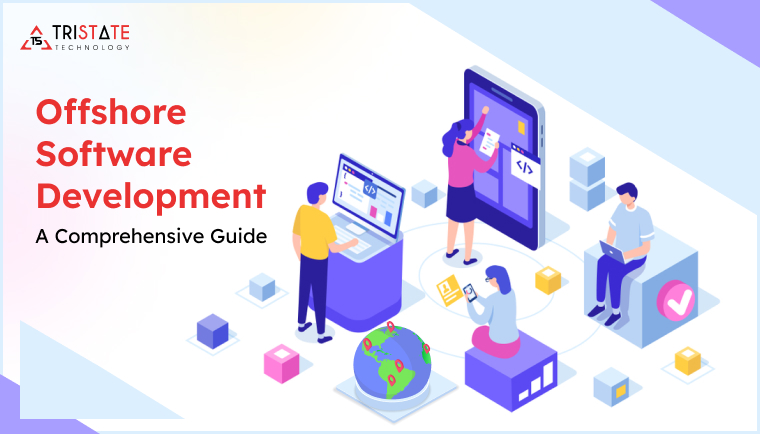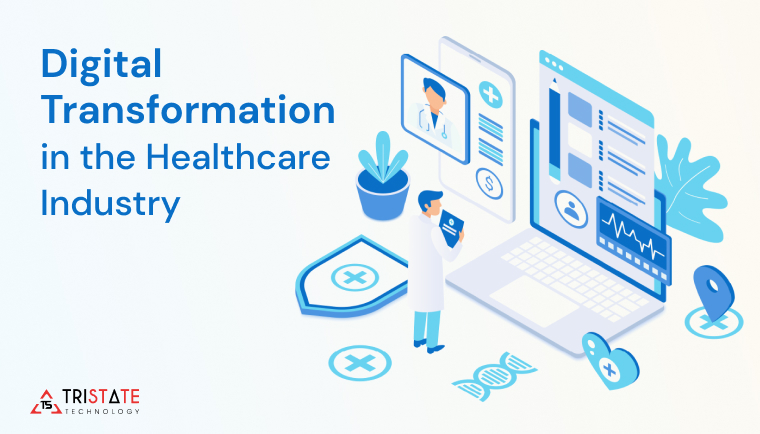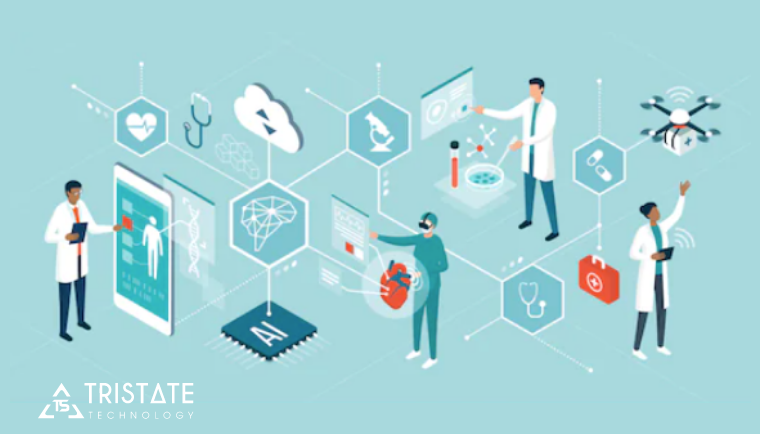
We are now doing more than ever with Artificial Intelligence (AI), especially in the health care sector. AI has provided a more efficient way to automate drudgery and other everyday tasks and manage patients and medical resources.
The system can handle most tasks previously handled by humans while doing it faster and cheaper. This significant benefit has eased stakeholders’ health sector activities, especially hospital administrators, doctors, and patients.
Tractica, in its recent report, projected annual revenue of $8.6 billion from 22 healthcare AI tools by 2025. The current usage trends also suggest a global revenue of $34 billion by the same deadline.
Artificial intelligence has continued to reinvigorate and reinvent itself. There are now modern machine learning solutions capable of acting, learning, understanding, and predicting. This is a step further than the surgery-assisting robots and linking genetic codes previously driven by AI.
Artificial intelligence development in healthcare comes with some risks and challenges. For instance, AI system errors put patients at risk of injuries. Likewise, the patient’s data for AI reference puts the patient at the risk of privacy invasion.
This post discusses the major opportunities that come with AI while touching on the challenges and risks that come with such opportunities. We will start with the advantages.
Advantages of artificial intelligence in healthcare
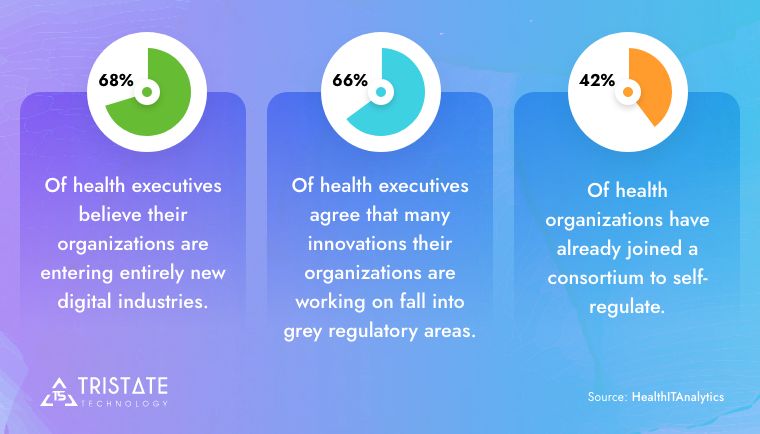
1. Improved accessibility.
Most developing countries struggling to keep up with the fast-paced global technological advancements have limited or no access to standard healthcare facilities and systems. For inhabitants of such a country, the risk of dying is higher. According to WHO, limited or zero healthcare accessibility is responsible for the 18.1-year gap in life expectancy currently recorded between the world’s richest and poorest nations.
With AI innovations, these disadvantaged areas can enjoy an efficient healthcare ecosystem. AI-backed digital systems can facilitate patient diagnosis and treatment. There are dedicated applications developed to help international and national healthcare organizations come together and render necessary assistance to people who need them.
Explore how Ada reacted to the global pandemics by enabling disease self-assessments across the countries.
2. Sharing Information Is Simple
Easy information sharing is an additional advantage of Artificial Intelligence in healthcare that merits mention. To fully realize the potential of AI and precision medicine, algorithms must be able to analyze large amounts of data quickly.
Artificial intelligence in healthcare can locate particular patient data more effectively than conventional care, giving doctors more time to concentrate on medications and treatments.
The condition requires immediate treatment and management, and Artificial Intelligence can provide providers with data-driven assistance. For instance, a glucose broadcasting system enables people with diabetes to monitor their glucose levels in real-time and acquire reports to discuss and manage their advancement with physicians or support groups.
Wearable device data can indicate the likelihood of contracting a particular disease. A revolutionary healthcare data treasure trove could emerge as the healthcare industry uses AI to store, collect, and analyze data.
3. Early diagnosis.
AI-driven tools now rely on people’s data to assess the previous and present health issues of patients. By comparing the disease details, healthcare professionals are positioned to diagnose more accurately. The database in several healthcare mobile apps has computed millions of symptoms and diagnoses. More importantly, it can predict the potential health issues an individual can encounter in the future.
For instance, Verily from Google is an application created to forecast hereditary and non-contagious genetic diseases. With such tools at their disposal, health experts can correctly predict and prepare for possible threats in the future by taking the right steps today. Likewise, healthcare facilities are now known for better operational management, thanks to the predictive analysis.
4. Increased speed and reduced costs.
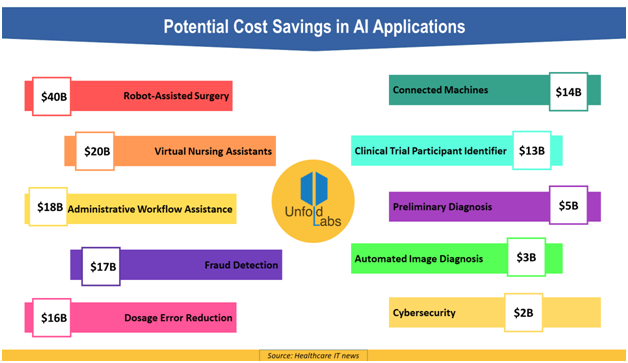
Thanks to AI algorithms, healthcare processes are now faster and at a fraction of the original costs. From patient examination to diagnosis, the AI has really changed the game in terms of speed and costs. For instance, the AI can identify the biomarkers that suggest disease in our bodies. AI-algorithms have minimized the manual work involved in specifying these biomarkers. The massive automation means we can now save more lives by acting faster.
AI algorithms are considered more cost-efficient compared to traditional methods. Patients can take fewer trips to the laboratory, with AI algorithms providing prediction-based results based on personal information. This is responsible for the increased implementation of AI across the board in the last year – up to 88% more organizations made the transition.
5. Improved Care For Patients
Patients have a poor experience due to crowded and chaotic healthcare facilities. Utilizing AI can help patients quickly navigate through data, obtain reports, and be directed to where to go and who to see, thereby avoiding the usual confusion in healthcare settings. A recent study reveals that, according to 83% of patients, poor communication is the most unpleasant aspect of their experience.
Another unbeatable advantage of AI technology for patients is its availability round-the-clock. An incredible illustration of artificial intelligence for medication that further develops the patient’s experience is Babylon, an application that has capabilities as an intuitive side effects checker. To provide accurate, up-to-date medical information, the system asks questions, looks at the answers, and looks at symptoms and risk factors that are already known.
6. Efficient and unique assistance in surgery
Artificial Intelligence development has taken a huge leap in robotic applications. The same is the case for machine learning implementation in surgery. There are dedicated AI Surgical Systems that can execute the tiniest movements with 100% accuracy. This means we can do complex operations efficiently with reduced risks of side effects, blood loss, or pain. Likewise, post-surgery recovery is faster and easier.
For instance, patients waiting for operations are subjected to Antibacterial Nanorobots to eliminate all infections in their blood before going under the knives. Perhaps, the best part is the AI-backed information on the patient’s present situation, available to surgeons in real-time. This has helped to quell doubts in patients, especially regarding surgery under general anesthesia.
7. Enhanced human abilities and mental health support
Robots can now assist patients alongside the medical staff. For instance, exoskeleton robots can help paralyzed people regain their mobility with little or no help from caretakers. Likewise, smart AI-backed prostheses are fitted with sensors that serve as more reactive limbs than traditional models.
Service robots from machine learning implementation can handle daily tasks and keep the company of patients. There are dedicated companion and conversational robots that carry out necessary tests and checks – sugar levels, blood pressure, controlling temperature, and even taking pills. There are robots developed to help depressed patients, thanks to their in-built analytic capabilities. With these capabilities, they can analyze the mod of the patients and help them feel more positive.
That’s all about the benefits. Now, let’s move to the challenges.
How artificial intelligence is revolutionizing the healthcare industry?
Find out more!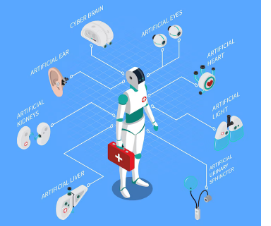
Adopting artificial intelligence in healthcare: what are the challenges?
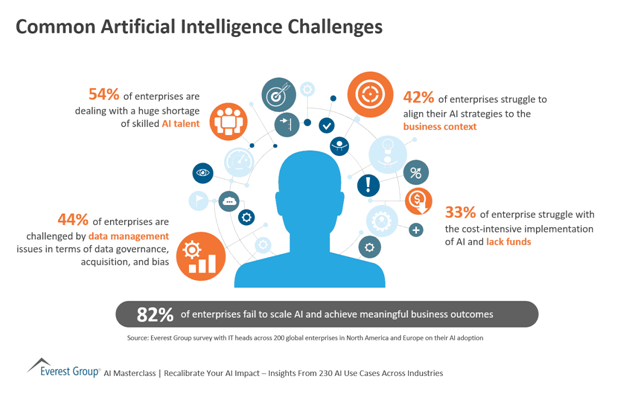
Source: Everest Group
Just like there is a Yin and Yang in everything, there are advantages and disadvantages of artificial intelligence in healthcare industryas well.Despite the massive progress that comes with Artificial Intelligence development, few notable challenges are yet to be sorted, mainly when it involves data. To get the best out of artificial intelligence development and machine learning implementation, we need to solve challenges like:
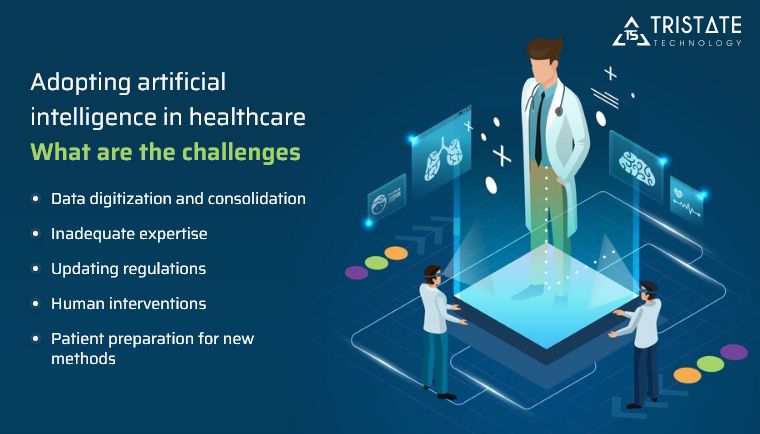
1. Data digitization and consolidation.
The underlying principle in most, if not all, AI projects is the garbage-in-garbage-out principle. Without the massive chunk of data fed into the AI systems, it is practically impossible to get results. This is why it is important to source high-quality healthcare data – a move that has become increasingly difficult over the years. The difficulty is attributed to the fragmented and unorganized health data spread across various data systems and organizations. Patients change insurance providers and healthcare providers too frequently, making data acquisition a challenge.
It is even more challenging to digitize or consolidate these data in some countries where the low quality of data and siloed data systems are used. The situation is slightly better in the US, with moves to fasten the digitization of medical systems. However, the quality of digitized information is not the best. According to a ,eClinical works, one of the biggest record-keeping software giants in the system, had a flawed system that puts patients at risk.
With updated and digital record systems, improved accuracy and efficiency is guaranteed in the healthcare sector. This is why healthcare stakeholders must perfect digitization and consolidation of medical data. It is the only way to feed the AI with the information needed to deliver accurate analysis and drive efficient processes.
2. Inadequate Expertise
Clinicians rarely possess AI expertise. It is difficult, if possible, for the average user to comprehend how an Artificial Intelligence system concludes because it is intended to act like the human brain. The “black box” problem is the name given to this problem. Specifically, the system receives and processes input, but we need to know what occurs in the middle.
The black box issue must be solved in healthcare. For instance, AI can put lives at risk if a doctor/physician cannot diagnose why it recommends a particular treatment or diagnosis. In this way, with the present status of artificial intelligence, it’s fundamental that these arrangements are constantly utilized by specialists, who can directly up-mark a particular well-being proposal and oppose it.
The successful implementation of AI within your own business is another obstacle. In addition, proper experts with knowledge of the healthcare industry and experience creating AI-integrated solutions are highly required. Nevertheless, Data science is a small area of expertise.
3. Updating regulations
There are tons of strict confidentiality and privacy laws guarding medical records worldwide. With such protection, we can interpret data sharing among AI systems into legal violations. In cases where it is legal, patients must provide their consent to obtain medical data and use them for such purposes.
The logistical challenge that comes with this is immense. There is a need for flexible rules on medical data acquisition with identity protection. Medical institutions must also ensure strict compliance with such rules and be accountable for patient data acquisition and use. This is the most viable way to curate accurate, high-quality medical data for AI technologies. a
4. Human interventions.
A good number of patients and medical professionals have doubts about AI. Radiologists do not want robots to take over their jobs. Patients do not want to surrender themselves to machines to deal with their health concerns properly.
5. Patient Preparation For New Methods
When the pandemic struck in early 2020, video doctor appointments were met with some unpredictability. Patients need to be made aware of how a doctor can accurately evaluate their conditions or check a patient’s blood pressure without seeing them in person. When patients realize that robotic-based surgery means less scarring, less blood loss, and a quicker recovery, they may be more open to AI. Trust will develop among patients as they become familiar with the benefits of artificial intelligence in healthcare.
Without correcting these impressions, it won’t be easy to build an AI-driven health care system. AI should be seen as a helper designed to assist healthcare practitioners to execute their diagnostic roles. The right mindset is key to embracing AI-assisted medical practices.
Let’s discuss the potential risks associated with AI in the healthcare sector.
Potential risks of artificial intelligence in the healthcare system
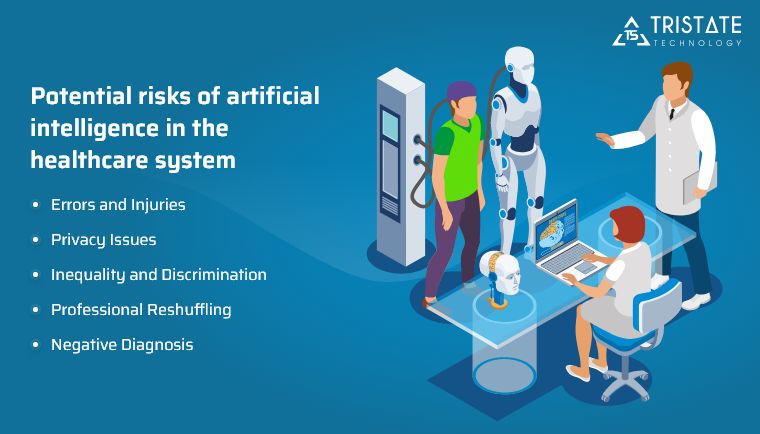
The Brookings Institution published a report that confirms the existence of AI-related risks in healthcare. We have highlighted them below:
1. Errors and injuries.
AI systems are prone to errors, which eventually leads to patient injury or other significant problems. For instance, a patient may take a drug wrongly recommended by the AI system, leading to more questions. Likewise, the AI-driven radiological scan may miss a tumor. The wrong allocation of a hospital bed based on AI predictions can lead to injuries and relapse.
The bigger problem with AI-related errors is the potential to be far-reaching. Tons of patients could suffer from just one error. Likewise, no family or friend will take it lightly, hearing that their loved one suffered a setback because of a computer error. The online patient review system means it is more comfortable to put out a bad word about AI capabilities but tough to recall it.
2. Privacy issues.
Privacy is a serious concern regarding patient data acquisition. While researchers have measures in place to protect patient data, there are malicious hackers out there trying to get access at all costs. If a giant like Google can have privacy and patient data issues, then it means no one in AI should overlook privacy issues.
Another way privacy is at risk with AI is the system’s capability to predict information about patients, even when the algorithm was not fed with such data.
3. Inequality and discrimination.
The AI is not immune to bias. In fact, the faintest hint of discrimination is always reflected in the results. For instance, when data sourced from academic medical centers is fed into AI systems, such a system may struggle to treat or benefit populations from other areas apart from academic medical centers. Likewise, using speech-recognition AI systems in transcribing notes may reduce the AI’s efficiency when the provider is of a gender or race that is a minority in the training data.
4. Professional reshuffling.
We may experience shifts in the medical profession if the AI technology is completely implemented. Some scholars’ opinion on the widespread use of AI reducing human knowledge and capacity over time is gaining grounds. According to them, it may get to a point where providers can practically curb AI errors or advance medical knowledge.
5. Negative Diagnosis
In this article, we have already discussed the requirement for high-quality information. However, there is a substantial risk of incorrect diagnosis if Artificial Intelligence systems are not managed with sufficient information from various backgrounds. Doctors only have sufficient AI experience to point out a mistake if AI can be explained. Accountability is questioned in the event of a wrong diagnosis.
For instance, is the doctor in charge who used AI to make the decision responsible for the mishap or error? Healthcare may face a variety of ethical quandaries as a result of AI deployment. However, it is essential to comprehend that medical and AI diagnoses have an edge of error. A worldwide research on primary care mistakes found that 5 percent out of all the patients receive an incorrect diagnosis and A tertiary of all serious illnesses misdiagnoses that result in harm.
Looking for an experienced healthcare software development partner?
Let’s start a project together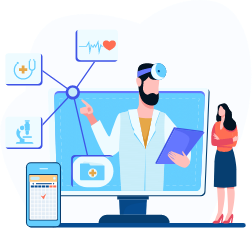
Finally
While there are risks and challenges, it is clear that robotics and AI bring huge benefits to the global healthcare ecosystem. The Internet of Medical Things and AI-driven tools have recorded significant success, especially in human lives. With AI, we are now better aligned with conscious health management and an overall healthy lifestyle.


